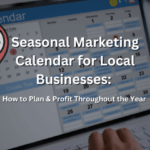Choosing the most appropriate keywords to target on your web pages can be a challenge, so before writing any content, you need to use the right tools to identify the most relative keywords that you want search engines to rank your website by. A common pitfall is choosing keywords that either have such a high level of competition that it is too difficult or too competitive to achieve effective rankings. Or you could choose such a low searched keyword that it has very minimal traffic opportunities. Finding the right balance is the key.
admin

Recent Posts
- Recession Proof Branding for Local Businesses: Strategies to Stay Top of Mind in Your Community in 2026
- Turning Walk-In Traffic into Omni-Channel Leads: A Step-by-Step Guide for Local Shops and Service Providers
- Seasonal Marketing Calendar for Local Businesses: How to Plan & Profit Throughout the Year
- Chatbots & Conversational Marketing for Service Businesses: Turning Talk into Leads
- Hyperlocal Content Marketing: How to Become the Go-To Resource in Your Neighborhood
Categories
- About Clear Imaging 4
- Advertising 67
- AI 16
- Analytics 3
- Blog 11
- Branding 4
- call to action 4
- Content 59
- Design 3
- E-Commerce 4
- Email Marketing 34
- Facebook 46
- Google Business Profile 1
- Google Local Ads 2
- Google Maps 18
- Google My Business 23
- Google Plus 22
- Hiring 1
- LinkedIn 4
- Linking 8
- Local Business 9
- Marketing 177
- Mobile Web 3
- Pinterest 4
- Print 1
- Productivity 2
- Promotion 83
- Public Relations 41
- Public Service Announcement 3
- Reputation 22
- Reputation Management 25
- Sales 36
- Search Engine Optimization 125
- Security 3
- Social Media 113
- TikTok 1
- Traffic 1
- Twitter 8
- Uncategorized 19
- Video 4
- Web design 2
- Website Improvement 49
- Website Tips 56
- Websites for Businesses 31
- Youtube 6
Tags
ads advertising ai blog branding content email marketing facebook google Google Maps Google My Business google plus Google Reviews instagram linkedin marketing pinterest PR promotion Public Relations reputation management Reviews sales SEO small business social media twitter website tips Yelp youtube





